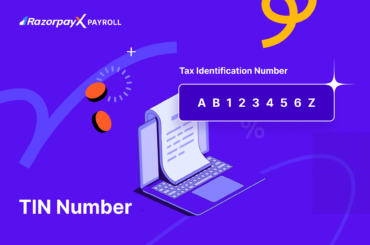Table of Contents
What is Basic Salary?
Basic salary is the fixed amount an employee earns for work done before addition of benefits or any deductions. It is the core salary upon which benefits or variable bonuses are added and taxes, PF etc are deducted.
Understanding the concept of basic salary allows individuals can make informed decisions about their financial well-being and career progression.
Businesses that use robust payroll software like RazorpayX Payroll can provide employees with a transparent, clear payslip detailing the breakdown of their salary, including basic pay, allowances, deductions, etc.
Did you know? RazorpayX Payroll can integrate with WhatsApp and Slack, allowing employees to easily access payslip information!
How to Calculate Basic Salary?
Basic salary is used to calculate all other components of an employee’s net pay. For example, provident fund contribution is 12% of your basic pay.
Once all benefits have been added and deductions calculated from the basic pay, the resulting amount is the gross salary. Therefore, we can calculate basic salary from gross salary with the following formula:
Basic Salary = Gross Salary – Total Allowance (HRA, DA, Medical insurance, others)
Here is an example of an employee’s salary with all its different components.
| Component | Monthly |
|---|---|
| Direct Components | |
| Basic Salary | ₹50,000 |
| House Rent Allowance (HRA) | ₹25,000 |
| Dearness Allowance (DA) | ₹5,000 |
| Conveyance Allowance | ₹3,000 |
| Other Allowances | ₹2,000 |
| Indirect Components | |
| Provident Fund (PF) Contribution (Employee) | ₹6,000 |
| Provident Fund (PF) Contribution (Employer) | ₹1,800 |
| Totals | |
| Gross Salary | ₹85,000 |
| Cost to Company (CTC) | ₹1,03,800 |
Factors Affecting Basic Salary
Complexity of job, skill level and experience of the employee is the main and most important factor that goes into consideration when deciding an employee’s basic salary.
Positions with greater responsibilities and specialized set of skills typically command higher salaries. Experienced employees can also negotiate for higher salaries.
The profitability of the company, HR and company policies as well as the industry it operates in are also important factors. The more profitable or high-growth the company is, the more the basic pay will be.
The location also determines the basic pay. If the company or employee are in a location with high cost of living, they might pay more than a company in a low-cost area.
Tax Liability on Basic Salary
As the basic salary increases, the employee might fall into a higher tax bracket, resulting in a larger tax amount due. India’s progressive tax system dictates that individuals with higher incomes pay a larger percentage of their income as tax.
Basic salary can also indirectly affect an employee’s tax liability through other components of their compensation package.
Allowances like HRA (House Rent Allowance) offer partial or full tax exemption, reducing the employee’s overall taxable income and potentially lowering their tax liability.
Additionally, employer contributions to provident funds like EPF are deducted before calculating the taxable income, further impacting the employee’s tax liability.
Basic Salary, Gross Salary and Net Salary
Basic Salary: This is the foundation of your compensation package. It’s a fixed amount determined by factors like your position, experience, and industry standards. It represents the core compensation you receive for fulfilling your job responsibilities. Think of it as the base price of a product.
Gross Salary: This is the total amount you receive before any deductions are applied. It includes your basic salary, plus any allowances you might receive, such as House Rent Allowance (HRA), conveyance allowance, or other monetary benefits offered by your employer. This is like the total price of a product before any discounts or coupons are applied.
Net Salary (Take-home Pay): This is the final amount you actually receive after all deductions are subtracted from your gross salary. These deductions can include income tax, provident fund contributions, professional tax, and any other mandatory contributions. This is the final price you pay after applying all the discounts and coupons.
Salary Components Comparison Table
| Term | Description | Inclusions | Exclusions | Impact on Taxes |
|---|---|---|---|---|
| Basic Salary | Fixed core pay based on position and experience. | None | Allowances, bonuses, benefits, deductions. | Directly contributes to taxable income. |
| Gross Salary | Total salary before deductions. | Basic salary, allowances (HRA, conveyance, etc.), other monetary benefits. | Taxes, provident fund contributions, professional tax, etc. | Serves as the base for calculating taxes. |
| Net Salary (Take-home Pay) | Final amount received after deductions. | None | Gross salary minus all deductions (taxes, contributions, etc.). | Reflects the final amount after accounting for all tax liabilities and contributions. |
Components of Salary
Your salary has various components, including basic pay.
Basic Salary: This is the foundation for calculating several allowances and deductions.
Allowances:
-
- House Rent Allowance (HRA): Compensates for rental expenses. The amount and tax exemption can vary depending on your city of residence. The government has classified cities into X, Y and Z based on population and cost of living.
- Dearness Allowance (DA): Dearness allowance is provided by the Government to public sector employees and pensioners to adjusts salary to offset inflation.
- Leave Travel Allowance (LTA): Provides tax benefits for domestic travel expenses for the employee and family.
- Conveyance Allowance: Reimburses the employee’s commuting costs to and from work.
- Medical Allowance: Covers medical expenses for the employee and their dependents.
- Special Allowances: Company-specific allowances like phone, food, uniform, etc.
Employer Contributions:
-
- Employees’ Provident Fund (EPF): A mandatory retirement savings scheme with contributions from both employee and employer.
- Employees’ State Insurance Corporation (ESIC): A state-run social security scheme providing medical benefits and other forms of coverage, subject to salary thresholds.
- Gratuity: A lump sum payment made after completing a certain period of service (usually 5+ years).
Other Benefits:
-
-
- Flexible Benefits Plans: Allows employees to choose from a range of benefits like food coupons or internet/broadband reimbursement.
- Company Car or Car Lease Programs: Provides a vehicle or lease assistance.
- Subsidized Meals: Offers meals at the workplace at reduced costs.
-
FAQs
What is the difference between CTC and gross pay?
CTC (Cost to Company) represents the total expense a company incurs for an employee annually, including benefits and contributions like health insurance and provident fund. Gross pay is simply the total salary an employee receives before deductions like taxes, and doesn't include benefits. So, CTC is always higher than gross pay, reflecting the company's full investment in the employee.
What is the limit of PF contribution for employees?
The maximum employee contribution to the Employee's Provident Fund (EPF) in India is 12% of their basic salary. However, employers have a maximum contribution of 12%, capped at ₹1,800 per month, even for higher salaries. This means the total contribution (employee + employer) reaches a maximum of 24% of the basic salary, capped at ₹3,600. Remember, employees can choose to contribute voluntarily above the mandatory 12%.
Is overtime pay a part of basic salary?
No, overtime pay is separate from basic pay and is considered special compensation for work done beyond standard work hours.
Is basic salary taxable?
Yes, basic salary is fully taxable in India. It forms a crucial component of your taxable income, directly impacting your tax liability. As your basic salary increases, you might fall into a higher tax bracket, resulting in a larger tax amount you owe.
Is it better to have a lower basic salary?
While a lower basic salary can mean potentially lower taxes and potentially higher take-home pay due to tax-exempt allowances, it also leads to lower contributions to retirement savings and potentially limits your access to loans. Carefully weigh both sides considering your tax bracket, offered allowances, and future financial needs.





